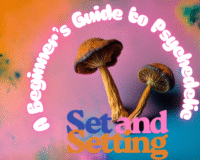Introduction: From Ineffable to Actionable
One of the most common words used to describe a profound psychedelic experience is “ineffable”—a state of being too great or extreme to be expressed in words. While this is true, the magic doesn’t have to vanish when the experience ends. The insights, emotions, and novel perspectives gained during your research are like rare and precious elements. To truly benefit from them, you must find a way to capture and integrate them into your life.
This is where the simple, humble practice of journaling becomes an alchemist’s most essential tool.
A psychedelic journal is more than just a diary; it’s a dedicated laboratory notebook for your consciousness. It’s a space to document, process, and ultimately, understand your journeys. Here at Psychedelics Solution, we believe that the “work” of a psychedelic experience often begins when the acute effects wear off. A journal is your guide for that next, crucial phase.
Before the Journey: Setting the Stage
Your journal’s role begins before you even consume a substance. This pre-journey documentation helps you solidify your “set” (your mindset) and clarify your intentions.
What to write before your experience:
- Your Starting Point: Document your current life situation. What are your joys, your challenges, your pressing questions? What is your emotional and psychological state in the days leading up to the experience?
- Your Intentions: Write down what you hope to explore. Frame these as open questions rather than demands. For example, instead of “I want to solve my anxiety,” you might write, “I want to explore my relationship with anxiety” or “I am open to understanding the roots of this feeling.”
- Your Dose and Substance: Note the specific substance and the exact dosage you plan to research. This is crucial for consistency and learning.
During the Experience (If You Can): Capturing Fleeting Moments
This can be challenging, and you should never force it. Interrupting a profound state to write can be counterproductive. However, sometimes a simple word, a sketch, or a single phrase can act as a powerful anchor to a complex memory later on.
Tips for journaling mid-experience:
- Keep it brief. A single keyword (“connected,” “geometry,” “forgiveness”) can be enough.
- Don’t worry about grammar or legibility. This is for you alone.
- Consider a voice recorder. Speaking can sometimes be easier than writing. You can transcribe it later.
- A sketchbook can be invaluable if your experience is highly visual.
After the Journey: The Integration Phase
This is where your journal truly shines. As soon as you feel able and clear-headed (often the next day), set aside time to write freely about your experience.
What to write after your experience:
- The Narrative: Describe what happened from beginning to end, as best as you can remember. What did you see, feel, and think? Don’t censor yourself. Write down the strange, the beautiful, the confusing, and the challenging parts.
- Key Insights and ‘Aha!’ Moments: Did any particular thoughts or realizations stand out? These are the gems. Write them down in as much detail as possible before they fade.
- Emotional Resonance: How did you feel? Explore the full spectrum of emotions without judgment. Did you feel joy, grief, confusion, or peace?
- Connecting to Your Intention: How did the experience relate to the intentions you set beforehand? The connection might be direct or highly symbolic.
- Actionable Steps: This is the most critical part. Based on your insights, what is one small, tangible action you can take in the coming week? If you explored your relationship with nature, maybe the action is to take a walk in the woods. If you felt a sense of connection, maybe it’s reaching out to a friend.
The Ongoing Practice
Your journal isn’t a one-time report. Re-read your entries a week, a month, or even a year later. You will be amazed at how your understanding of the experience deepens and evolves over time. These entries create a personal map of your consciousness, revealing patterns, growth, and the beautiful, intricate path of your own unique journey.
By documenting your explorations, you transform a fleeting experience into a lasting tool for personal growth. You become not just a tourist of your own mind, but an active, engaged cartographer.
Disclaimer: This article is intended for educational purposes only and does not constitute medical advice. Psychedelic substances involve risks and are subject to legal restrictions which vary by location. Please ensure you are in compliance with all local laws and prioritize your health and safety.





0 Comments
This is exactly what i was looking for, thank you so much for these tutorials
It would be great to try this theme for my businesses
What a nice article. It keeps me reading more and more!